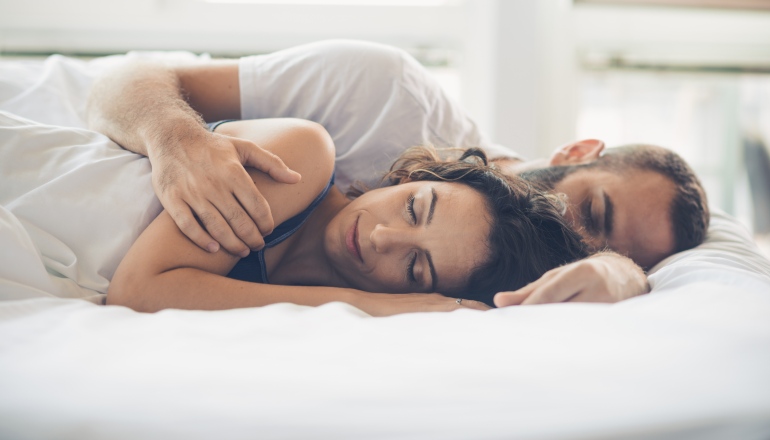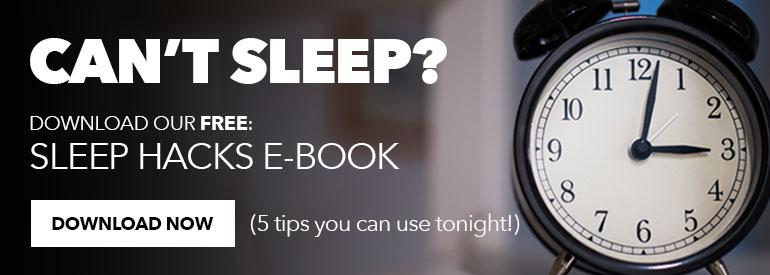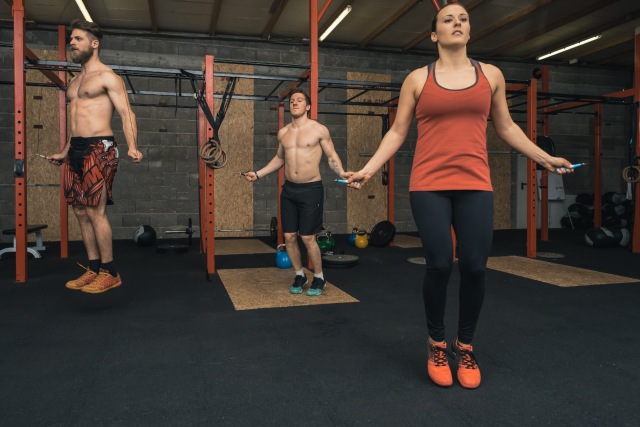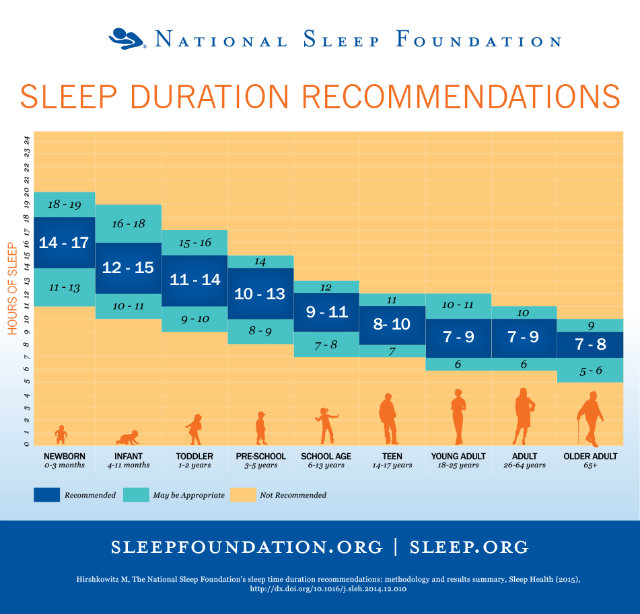
One thing you’ll never find me without is a watch.
Maybe it’s the trainer in me, but for years my day was run by time hacks, work bouts, meal intervals, and perhaps most importantly an imaginary must-go-to-sleep buzzer. For most of my single years, no matter how good the company or the TV show, 9pm was lights out time.
But then I met the partner who made me break all my little rules. He could keep me up talking late into the night, ignoring my trusty watch. I was, however, not ready to give up my early morning, high-intensity workout.
And just like that, I found myself burning the candle at both ends.
So how exactly do sleep and exercise impact one another? And which types of exercise does a lack of sleep impact the most? Is there a minimum sleep requirement for safely exercising?
Let’s take a look at how to balance these two important daily habits for maximum benefit.

Quality Sleep Improves Exercise
What’s an ultimate Saturday look like for me? Without the constraints of the workweek, my day looks pretty ideal when it comes to my health. I sleep nine hours (as opposed to my regular seven), have a long, mid-morning workout, and follow-it up with a healthy brunch. (Any ideas on how I could get paid to do this for a living? Message me in the comments section below.)
What I’ve discovered over the years is that my highest performance in exercise in a given week always comes after my greatest night of sleep. Even if you simplify “highest performance” to the exercise that felt the smoothest, and least strenuous, I’d guess you can relate to this feeling. Science backs this principle, too, as research shows quality sleep that lasts over seven hours improves athletic performance, reaction time, mood, and vigor.
In fact, researchers believe athletes may need more like nine hours of sleep in order for the body to recover and be prepared for more exercise. Some top athletes boast getting ten to twelve hours of sleep per night as providing competitive advantage. (Need I say — jealous?)

But Does Exercise Improve Sleep Quality?
When we are proudly checking all those Whole Life Challenge habit boxes, it might be obvious that great sleep makes for better exercise, but did you know exercise also makes for great sleep?
In fact, a 2018 review of research correlating exercise and sleep defined exercise as a low-cost treatment for insomnia. The research showed that exercise has positive effects on sleep quality, the amount of time it takes to fall asleep, total sleep time, and sleep efficiency.
Researchers have found that thirty minutes of moderate aerobic activity improves deep sleep during which the brain and body rejuvenate. They’ve also found exercise helps to stabilize mood and thereby may make it easier to fall asleep. The science also shows that practicing a regular exercise routine for as little as four weeks can improve sleep.
What About the Timing of Sleep and Exercise?
Is exercise before bedtime a no-go? (I’m whipping out my watch again here.) There are two after-effects of exercise that may impact sleep:
- The body releases endorphins after exercise, which cue the body to remain awake. The effects of this may last for one to two hours after exercise.
- Exercise raises the core temperature of the body, also signaling the body to be awake. This effect can last thirty to ninety minutes after exercise before your core temperature begins to come down. Sometimes the decline in core temperature can cause sleepiness, which could be a good thing when properly timed.
Doing the math here: if you’re going to work out for thirty to sixty minutes, it’s probably best to get started at least three hours before you plan to put your head on the pillow. Of course, there are human exceptions to all these rules, as some of us can sleep immediately after exercise without issue. But if you feel you’re more sensitive to exercise impacting your sleep, then the three-hour rule might be a good rule of thumb for you to test.

When Strategy Turns Into Spaghetti
Plan as we may, there will be weeks in adult life when the clock gets the best of us. Whether consumed by work or fun, we all inevitably face the judgment call of whether it’s better to get our sleep or get in that workout.
To be honest, in this week alone, this has happened to me three days in a row.
So, do I extend my sleep? Work out later in the day? Work out anyway? If you consider the inverse of the positive relationship between great exercise and great sleep, you know where I’m going next. According to the Sports Science Exchange, inadequate sleep can decrease exercise performance, decision-making, and immune function, and it can even be a cause of weight gain.
But let’s get real: there are not a ton of research studies that have challenged participants to sleep deprivation followed by intense exercise — for a reason. The studies that do exist have mostly looked at the impact of one rough night of sleep on performance. But the bad news remains that even one night of poor-quality sleep (either short or interrupted sleep) can have an impact on performance, particularly when the activity chosen requires coordination.
So, Snooze for Safety or Work Out? What’s the Deal?
The National Sleep Foundation has release guidance in a handy sleep chart that makes sleep recommendations by age. The recommendation remains that most adults need seven to nine hours of sleep, with the rare exception of some adults only needing six hours.
If you’re hedging on the low end of this recommendation, and still committed to exercising, consider reducing the complexity of your workout activity to something that comes easily for you. Also consider limiting the time of the activity. Practically speaking, if you just can’t give up your exercise routine after a poor night of sleep, choose slow-steady cardio rather than box jumps and burpees.
And if keeping to your gym routine is the very choice that’s making the difference between getting five and seven hours of sleep, pick sleep instead and then try for a short, afternoon workout. Or start again tomorrow, by going to sleep earlier tonight.

Click the chart to see a full-sized version.
How Can You Set Yourself Up for Sleep Success?
Here are the National Sleep Foundations recommendations:
- Stick to a sleep schedule of the same bedtime and wake up time, even on the weekends. This helps to regulate your body’s clock and could help you fall asleep and stay asleep for the night.
- Practice a relaxing bedtime ritual.
- Use your bed for only two things.
- Avoid naps, especially in the afternoon.
- Exercise daily.
- Design your bedroom to establish the conditions you need for sleep. The room should be cool – 60-67 degrees. The room should also be free from any noise and light. Consider using blackout curtains, eye shades, ear plugs, “white noise” machines, humidifiers, fans and other devices.
- Make sure your mattress is comfortable and supportive. Nine or 10 years is the life expectancy for most good quality mattresses.
- Avoid bright light in the evening and expose yourself to sunlight in the morning. This will keep your circadian rhythms in check.
- Avoid alcohol, cigarettes, and heavy meals in the evening. Alcohol, cigarettes and caffeine can disrupt sleep.
- If you can’t sleep, leave the bedroom, do something relaxing, and come back to the bedroom.
So, You’re Saying I Can’t Cut Any Corners?
I searched high and low for you, hoping some research would say you could burn the candle at both ends and not melt in the middle. But the end finding is that you and I are both going to need seven or more hours of sleep in addition to keeping our exercise routines. (Hopefully we can keep our partners, too.)
Routine is queen (or king) when it comes to sleep and exercise. Skipping out on either can have reverberating effects on your health.
So, I guess I have some new alarms to set. How about you?



































